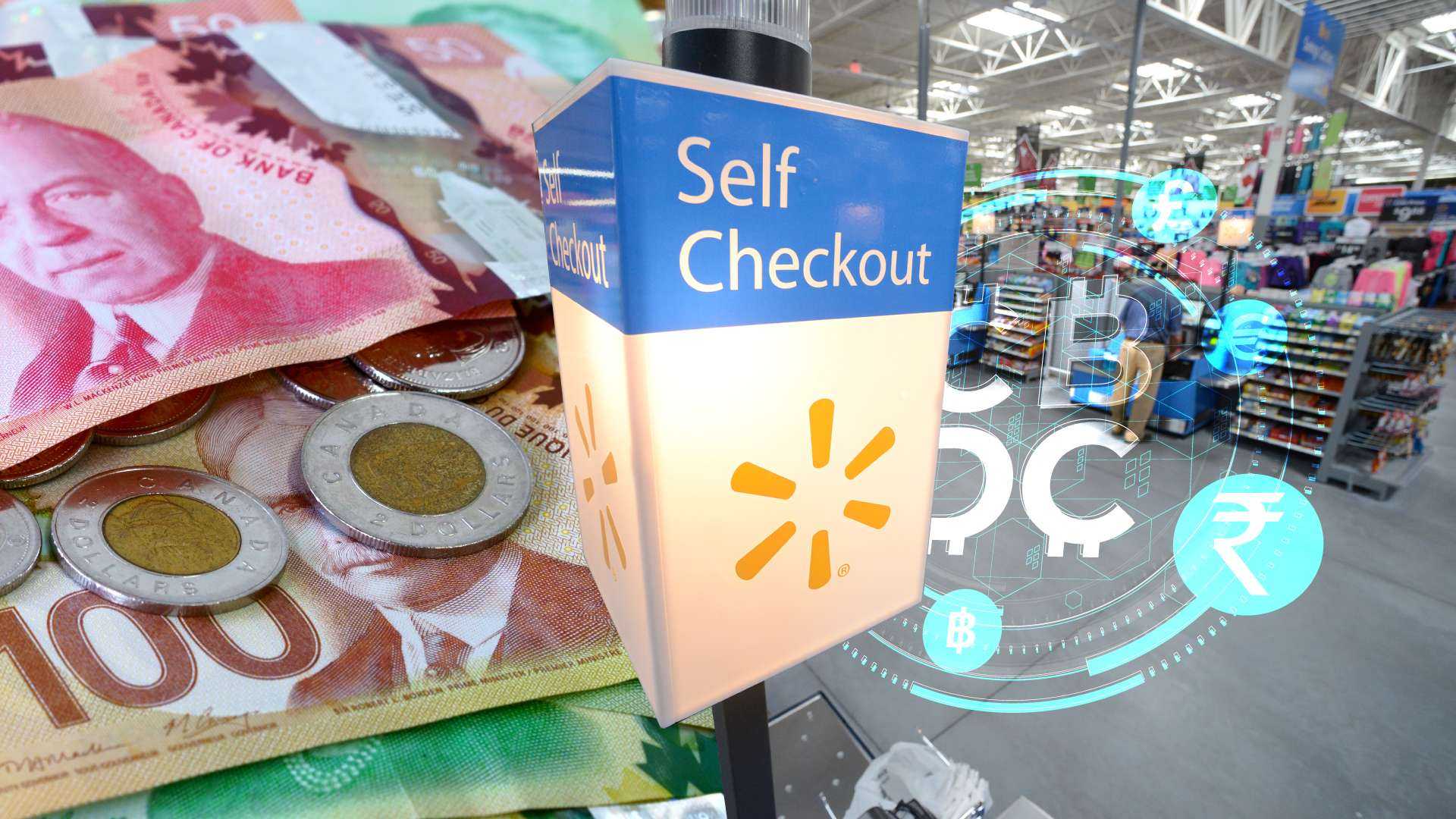BY SIMONE J. SMITH
Finally! Finished my shopping. I made my way up the aisle to check out. I was tired and wanted to get home and get some work done. As I neared the register, I was taken back by the fact that instead of people, I saw a row of machines, neatly lined up beside each other, waiting to take my payment. I saw two cash registers open that had two lovely smiling women waiting to help. I made my way over to them and the young lady gave me a big smile.
“Did you find everything okay,” she asked?
“I did, but I must say I am surprised that there are so few cashiers.”
“Yea, it is a little weird, but this is just the direction of the world.”
We spoke for a few more minutes as we were checking out, and that alone made me question the cashless revolution.
We’ve all heard that we’re moving towards cashless societies, but we’ve all probably brushed it off as doomsaying or too-far-into-the-future technology. Unfortunately for those who thought or are thinking that we’re getting closer to that reality. A cashless society doesn’t mean just a major shift from cash to electronic payments, it means a complete shift in that cash is no longer used for anything.
Canadians: the war on cash is real, and Canada ranks as one of the top 10 countries who will be looking to go completely cashless. Speed and convenience are driving the way Canadians are choosing to pay, but it all comes with a price — cash as a payment option is steadily declining. The spike in digital usage was fueled in part by the pandemic, as Canadians turned to virtual, mobile and online payment transactions.
According to Payments Canada, credit cards remain the top method of payment followed by debit, with Canadians reiterating ease, speed and convenience as the reasons they opt for plastic over cash.
A recent Global Payments Report projects that by 2025, cash will only make up three
per cent of all point-of-sales transactions in Canada — one of the lowest cash payment rates in the world. In some developing countries, cash is still the undisputed king of payments. The countries (out of 46 in the survey) where the least people were in favor of cashless payments were the Philippines and Egypt at 33% each and Morocco at 34%. One of the biggest reasons for people preferring cash in developing countries is not having a bank account and thus no bank card. In the Philippines, only 29% of adults had a bank account in 2019.
Outside of Canada, there are some countries who are welcoming the idea of having a cashless society. Let’s take a look at some of them.
Sweden
With a date set in 2023 to go completely cashless, Sweden is arguably the closest country to achieve this. It is currently not uncommon to see signs that say “No Cash Accepted” in various shops in Sweden.
A recent study from the European Payments Council showed that cash transactions accounted for only 1% of Sweden’s GDP in 2019 with cash withdrawals steadily declining by about 10% a year.
According to an article in SmarterTravel.com, some banking experts are predicting that Sweden will eliminate cash as a payment method by this year, and all of their transactions will use a digital payment method, such as: credit and debit cards, RFID signals, digital wallets, and so on. Should this happen, this would make Sweden the first cashless country in the world.
China
China is leading the charge in eCommerce and is the biggest eCommerce market in the world. With annual online sales of $672 billion and an annual growth rate of 27.3%, China doesn’t show signs of slowing.
In 2022, Zhongguancun Bank, which serves customers in the capital of Beijing, said it would suspend cash services, including over-the-counter deposits and withdrawals as well as cash services on ATM machines, starting from April.
Its decision comes after a similar move by another regional bank, NewUp Bank of Liaoning, in the northeastern province of Liaoning, who reported that they would stop cash services from March of 2022.
United Kingdom
The UK has embraced technology, including the digitization of money. London, specifically, has done the most so far. The country has a strong presence in online banking and it is currently in second place to just the United States when it comes to financial tech areas. This is correlated with the increase in merchants accepting more card and mobile payments.
Let’s segway a little from all the countries who feel that going cashless will be better.
There is a country that did try this, and it did not turn out well for them.
In November 2016, Indian Prime Minister Narendra Modi surprised his country with an announcement banning 500 and 1,000-rupee notes — worth about $7 and $15 respectively — in a bid to tackle corruption and terrorism.
His thought was that forcing people to exchange the country’s largest currency bills for new banknotes would allow the government to crack down on “black money” — unaccounted for cash holdings that haven’t been taxed but, under the law, should be.
He also argued that it would strike at domestic terrorist financing operations by capturing counterfeit money and rendering the legitimate cash they kept in the shadows worthless.
This initiative caused chaos across the country. People wanted new banknotes, but the current supply of them wasn’t close to meeting demand. That created headaches for people as they waited in long lines outside ATMs and banks, which routinely run out of cash. What did this mean for people who relied on daily cash earnings to survive? Well, these people were unable to take care of their basic needs.
The temporary shortage of banknotes had other far-reaching effects. Farmers looking to sow their next set of crops couldn’t buy the full quantity of seeds they needed. Property sales, which typically requires huge cash investments, slowed. The cash shortage was particularly hard on destitute Indians, many of whom don’t have bank accounts. Some of them had to choose between waiting in line for a day to exchange their defunct currency or work for a day’s wages. Many poor people ended up losing their savings because of their mistrust of financial institutions and concern about being harassed about where their cash came from.
Now that we have had a look at how the cashless revolution has impacted certain countries, let’s take a look at some pros and cons. This will paint a clearer picture for many of you.
Pros of a Cashless Society
Convenience:
It is convenient for consumers and for merchants, especially when those are traveling and dealing with currency exchange.
Lower Crime Rates:
Going cashless would mean there would be no tangible money to steal, reducing crime.
One country that has utilized this as one of their main reasons for going cashless is Jamaica. In light of the recent attacks at automated banking machines, conversations about Jamaica moving towards being a cashless society have become prominent again.
There are even talks that commuters will soon start using cards to pay for rides on buses and trains owned by the Jamaican Government as it digitalizes the $1.8 billion generated in fares annually.
Decreased Money Laundering:
It is harder for people to launder money without cash as it is much easier to track electronic payments/spending with digital paper trails.
Time:
A lot of time will be saved from not managing cash for both businesses and consumers.
Health Benefits:
In general, cash is dirty. The spread of viruses and other illnesses can be greatly halted when germs aren’t being spread through cash.
This one I questioned a little, so I did some research to see what was being said about credit cards and debit cards.
LendEDU.com, a finance website, tested various items for their germ scores and found credit and debit cards to be near the top of the list — not as dirty as New York City Park benches and rental-bike handles, for example, but more so than a urinal handle at Penn Station and more than the city’s subway poles.
Something to think about. Let’s move to the cons.
Cons of a Cashless Society
Security:
Should your bank account get hacked, you wouldn’t have any additional funds until it’s cleared up.
Spending Habits:
Some may have trouble saving money when physical cash isn’t leaving their wallets. Think about how many times you tap without thinking about the money that is coming out of your account.
Tech Problems/Glitches:
Should there be glitches or outages, merchants may have trouble accepting payments, leaving you without the ability to purchase goods when needed.
Does everyone remember not too long ago when we were unable to use our debit cards; I have never seen panic like that. People were lined up at bank machines frustrated that they were not able to use their cards.
Digital Paper Trails:
All transactions would be easy to track, and this could be something that frequent cash users won’t like. Who wants all of their business on the street like that. I know I don’t want everyone knowing what I am spending my money on.
We might be moving towards a cashless society in the future, but today, there are still many people who are unable to make digital payments because they don’t have a bank account, credit card, debit card or smartphone.
These people are known as the “unbanked,” meaning they don’t have access to affordable banking products and must instead rely on fringe services such as check cashing and payday loans. Distrust of banks is one reason why some households are unbanked, but more often, it’s because they lack access to affordable services.
Some don’t have the income and assets necessary to meet the requirements for fee-free bank accounts, while others live in banking deserts, the communities where banks have closed branches due to low profitability. Guess which communities this tends to happen in most; Black and Hispanic communities where the households make up a disproportionate number of the unbanked and underbanked.
It doesn’t help that the banking industry has a long history of discrimination. Moving to a cashless society could potentially increase this and allow retailers and restaurants to discriminate against segments of the population by up charging or denying service completely.
Another way to think about it is this, when people want to use a card to pay, that costs the business money. So, every time you go to a restaurant and pay with your card, that business is losing money. One thing some businesses have done to oppose the idea of a cashless society is to make their business “CASH ONLY.” What they will do is put an ATM in their stores so that people can use it. Some businesses own this machine themselves or they have a profit-share agreement. That way every time someone uses the ATM, you are supporting two small businesses: the business makes money, and the ATM provider makes money.
There is so much that can be said about the society that we are being forced into, but we do have a choice. It is up to us as citizens of our individual countries to speak up; if you don’t want to go cashless, let your local representatives know. Support businesses who do take “CASH ONLY,” and start keeping cash on you.
We all have a choice, and our freedom to spend how we want should not be taken away from us.


 Community News2 weeks ago
Community News2 weeks ago
 Community News2 weeks ago
Community News2 weeks ago
 Community News2 weeks ago
Community News2 weeks ago
 Community News2 weeks ago
Community News2 weeks ago
 Junior Contributors1 week ago
Junior Contributors1 week ago
 Community News2 weeks ago
Community News2 weeks ago
 Community News2 weeks ago
Community News2 weeks ago
 Community News2 weeks ago
Community News2 weeks ago































